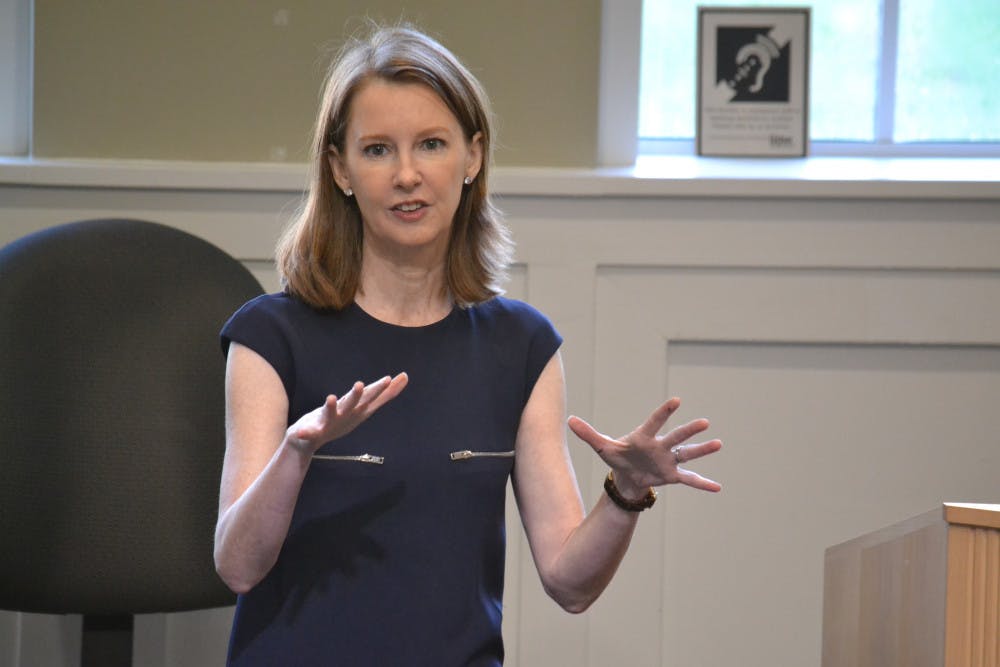By Connor Smith
News Editor
To paraphrase the late Yogi Berra, college is 90 percent mental, and the other half physical.
With that in mind, New York Times best-selling author Gretchen Rubin visited the College on Wednesday, Nov. 2, and facilitated a discussion about burnouts, mentalities and the development of fulfilling habits.
Rubin opened her presentation in the Education Building with a personal story of how she transitioned from law — with a job as a clerk for Supreme Court Justice Sandra Day O’Connor — to a more enjoyable life as an award-winning author and podcaster in the field of habits and happiness.
“When I finally realized I wanted to be a writer, I had an idea for a book that I wanted to write,” Rubin said to the audience. “I looked up at the Capitol dome one afternoon and I thought, ‘What am I interested in that everybody else in the world is interested in?’ I thought, ‘Power. Money. Fame. Sex.’ And that got me started on my first book, which is ‘Power Money Fame Sex.’”

Rubin continued to work for O’Connor during her initial research. Rubin used the Library of Congress throughout the process, which she said would have been awkward for anyone checking her office’s search history.
“Little known fact: If you are a Supreme Court justice, you can actually check out books from the Library of Congress,” she said. “I was checking books on things like ‘Deep in the Heart of Texas: Reflections of Former Dallas Cowboys Cheerleaders’ as part of my research. And what they thought Justice O’Connor was doing with that book — they never asked, so I never told.”
Rubin then opened up about her research into various mental quirks, like “night people” and “day people,” which Rubin asserted is not just a matter of converting one’s habits.
“It’s not a question of if you just go to bed earlier,” she said. “It’s largely genetically determined, and it’s also a function very much of age. It is very hard for people that are night people to be efficient, creative and energetic very early in the day.”
Rubin believes embracing one’s preferences is the key to long-term success.
“Instead of beating yourself up and trying to make yourself into a morning person, maybe you can set things up to do it when you’re most productive and creative,” she said.
Rubin also discussed workloads and answered questions about her theories on how different people respond to deadlines. She divides people into two categories: sprinters — those who need to push the limits of a deadline to succeed — and marathoners — those who work best planning work out and never pushing deadlines.
“Some people are marathoners and some people are sprinters,” she said. “Sprinters can sometimes be confused with procrastinators. Procrastinators and sprinters are both working against a deadline. Sprinters, they love it. They look back on their work with pleasure and think that it was great. Procrastinators are full of regret.”
Rubin encourages people to embrace their genetic wiring instead of working in spite of it.
“It can be tricky when you’re in a situation where people are insisting that you have to work one way, when your natural work style is another way,” Rubin said.
Rubin then discussed her ideas in and inspiration for her best-selling book “The Happiness Project.”
“When I wrote ‘The Happiness Project,’ I had 12 personal commandments, which were the big, big, big ideas that I want to govern my life,” she said. “The first one is to be ‘Gretchen.’”
Rubin said she wished she figured that out earlier, especially at the age of many of the students in attendance.

“I have to say that in college, and really in law school, I never really thought about what was true for me,” she said. “What actually was interesting? I never really thought about it. I was very focused on what I should do, and doing a really good job at that. If I looked back, there were all kinds of clues that I wanted to be a writer.”
Rubin also discussed drift, which she described as a person making a decision without actually deciding.
“Drift seems easy because it’s just going along with the current event,” she said. “In fact, drift can be a tremendous amount of work.”
According to Rubin, many medical students come to her and realize the only reason they devoted their lives to medicine was due to social pressure and drift.
“They look at me with terrified eyes and think, ‘Oh my God, I realized I’m in medical school because both my parents are doctors and I’m really good at science... I never really thought if I actually wanted to be a doctor,’” she said.
Rubin later answered a few questions from the audience, including one on burnout.
“Our physical condition is always (going to) color our emotional condition,” she said. “Especially if you’re doing work that’s related to your mental performance, you just really need to think about your body. Getting enough sleep, getting some exercise, not letting yourself get too hungry and managing mild discomfort.”
Rubin spent the rest of the discussion talking about a concept in her next book: All people can be divided based on how they respond to inner and outer expectations.
Rubin separated everyone in the room into four categories: upholders, questioners, obligers and rebels. Upholders are those that always meet inner and outer goals, whereas questioners will only meet goals they perceive as worthwhile. Obligers will meet goals given by others, but struggle with inner goals, while rebels resist any expectations — the opposite of upholders.
According to Rubin, if you think her list is arbitrary or unviable, you are likely a questioner.
By the end of the summit, both students and faculty alike were left with much to ponder, as Rubin’s goal was to trigger self-reflection in a path toward fulfillment.
In many ways, she succeeded.







